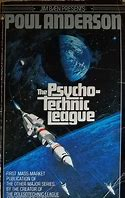The political conversation in Chapter II is not very interesting or informative. In the US, the (conservative) Labor Party rules in coalition with Republicans, Neofederalists and splinter groups and is opposed by Conservatives and Liberals but the main cross-party philosophical conflict is between libertarianism and totalitarianism. The Psychotechnic Institute advises the government. Enemies of the Institute spread fears about the extent of its influence. Dalgetty, who is with the Institute, fears that some other group controls all the political parties.
Do citizens of the US and of other countries vote for the UN world government? Does the Institute advise the UN government, the US government or both? I think that the lines of demarcation are unclear. The future of mankind, as always, is at stake. (In The Incredibles superhero film, Mr. Incredible says, "I wish the world would just stay saved!")

5 comments:
Kaor, Paul!
Your comments here makes me think that in some of his early works Anderson handled political and philosophical ideas more awkwardly than in stories written after 1958. His treatment of varying schools of thought was more sophisticated by then.
Stories are more interested if they focus on a problem or conflict that needs to be resolved. Or strengthens one of the parties in such a conflict. One example I thought of being A CIRCUS OF HELLS, where we see Flandry finessing matters in such a way that the Empire would not retreat from an important frontier outpost.
And that reminded me of THE DAY OF THEIR RETURN and "Outpost of Empire"!
Ad astra! Sean
BTW Sean
Why do you keep specifying 1958 as when Poul improved?
Kaor, Jim!
Because, IMO, from 1947 to 1957/58, many of Anderson's stories shows him as experimenting with different forms, themes, ideas, etc., before he found ways of writing that were the most natural and satisfactory for him. Also, it's my view that most of Anderson's weakest stories dates from this period. The flaws in them became vastly fewer in stories written by or after 1958.
Ad astra! Sean
Sean: I agree in general, tho' not necessarily on the precise date.
"Brain Wave" is 1953, and very good, for example.
Kaor, Mr. Stirling!
Understood! I thought dating Anderson's early phase from 1947 to 1958 a reasonable estimate.
I agree, BRAIN WAVE is a very good early novel. And I consider "The Immortal Game" one of Anderson's best early stories.
Ad astra! Sean
Post a Comment